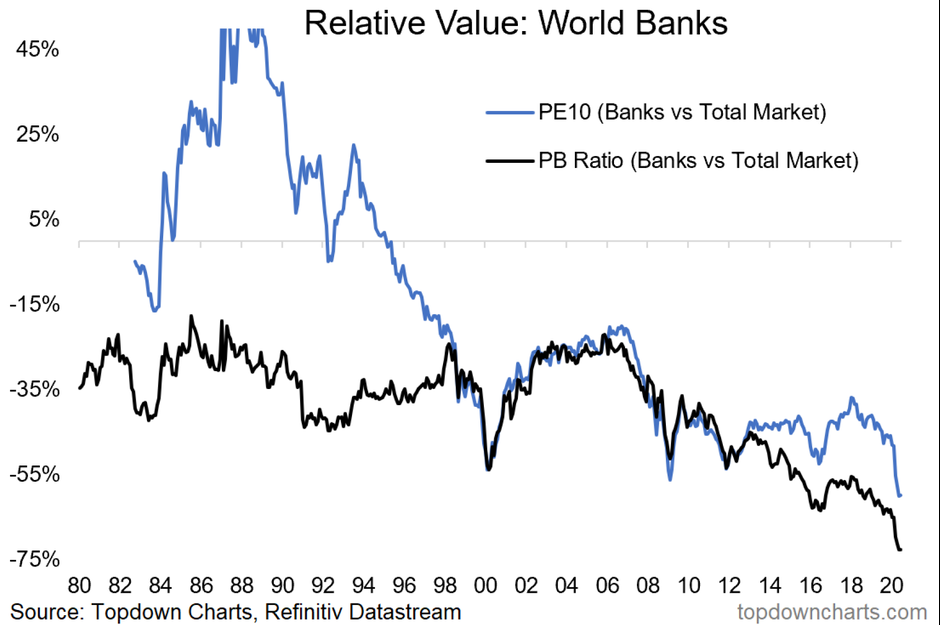by Mike Zaccardi, CFA, CMT
Tech and Financials. It’s like the hot-shot rookie versus the curmudgeon old man. By now, that rookie is worth billions of dollars and the old man is destitute.
So much of what has happened performance-wise during the last 10 years can be partially explained by differences in sector weights. To be fair, we did discuss how even when normalizing for sector differences, ex-USA equities are a better value than USA stocks.
Setting aside the relative attractiveness of foreign markets, what is happening among the Financials sector, specifically the (once) big World Banks, is interesting. Maybe ‘depressing’ is a better word? World Banks relative to the rest of the world are at very cheap valuations. This edition of the Chart of the Week is a look at some all-time lows.
We like to use the PE10 valuation tool as it does the best feasible job to gauge average true earnings over a 10-year period. It is helpful when analyzing long-term valuations and comparing markets. The relative value of World Banks to the Total Market has never been better. The same could be said back in early 2016, so of course it could continue to get cheaper. But thinking in probabilities, it is likely that over the next 5, 10, 20 years, global banking stocks will recover. They are cheap on an absolute and relative basis.

Putting more numbers to the story, global banking equities are trading at a massive 60% discount to the rest of the market on a PE10 basis. For perspective, during the mid-2000s, the sector traded at a paltry 20% discount. It’s now easier to understand why the Value style has been out of favor for so long and why foreign equity markets, with a much higher tilt to banks, have done so poorly versus the Tech-heavy US market.
On a nominal price chart, the Banking sector is trading around long-term support. It’s a sideways chart since 2010, drastically underperforming most equity indices. Naturally, the March 2020 washout resulted in virtually all components of the index trading below their respective 200-day moving average. A lot work is still needed to build from that capitulation moment a few months ago.
Regionally, banking stocks have performed terribly everywhere except for perhaps Asia ex-Japan (AEJ). Think about the major US Financials—many have gone nowhere as the S&P 500 has climbed since March 2009. In Europe, Deutsche Bank (DE:DBKGn) has been a disaster for equity investors while the UK banks have done nothing special. All of the regulations put in place following the Global Financial Crisis likely took their toll on the sector, not to mention market and technology forces at work. Add in declining interest rates (flattening yield curves), and the last 10+ years have been ugly.
Banks are always a different animal when doing valuation work. The Price-to-Book ratio is helpful when analyzing Financials. Global Banks are currently about 70% cheaper than the rest of the market using the PB. Within the Global Banking arena, which regions stand out as particularly attractive? I.e. which ones are furthest down in the dumpster? (and careful – the dumpster may be on fire!)
AEJ and USA banks are about even with each other, but developed ex-US (think Europe and Japan) financial stocks trade at materially lower valuations than AEJ and USA. In absolute terms, developed ex-US banks are at historical lows versus US banks.
A final valuation tool is the dividend yield spread. When equities get cheap, they tend to offer better dividend yields, so long as the index components can continue to pay out. There’s a caveat to everything, right? The dividend yield spread among World Banks versus the rest of the market is not far from all-time highs, currently 2.5%. It peaked near 3.5% for a fleeting moment during the GFC, then dipped to breakeven in 2009 before climbing to where it is now.
So where does that leave the sector’s valuation? Back to that of the early 1980s and below the range of the last decade.
Here’s the point: World Banks are cheap on an absolute and relative basis. The narrative of a more tech-driven world, toward alternative forms of payment and new ways of acquiring capital, is tough to break. Alas, 10 years of sharp underperformance has much of that narrative likely baked into the banking cake. But then again, maybe that hot-shot rookie has gotten in over his skies while the old man is just getting ready for his second act.
